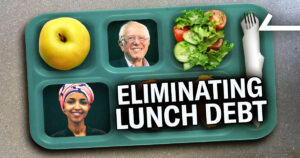Every time Taylor Swift, Kim Kardashian, or Elon Musk take a trip on their private jet, you’re subsidizing it.
Private jets make up one in six flights. But they contribute just 2% of the taxes to fund airports—while we pay 70%.
Why the discrepancy?
Commercial passengers pay a 7.5% tax on the price of each ticket they buy, in addition to a facility charge of $4.50 per ticket.
So an hour-long flight with 100 passengers on board paying $100 per ticket, for example, would generate $1,200 for the FAA’s Airport and Airway Trust Fund.
Private jet owners and flyers, on the other hand, pay a tax on jet fuel for each flight — 22 cents per gallon.
So a mid size private jet that burns a conservative 200 gallons of jet fuel for an hour-long flight will pay just $44 to the FAA’s fund.
How did we get here? As usual, the answer is lobbying.
The largest player in the private jet lobby, the National Business Aviation Association, has spent an average of $2.4 million each year since 2008 lobbying the federal government, primarily for tax giveaways like this one.
That’s how we got into a situation where Elon Musk, with a net worth of more than $230 billion, can take 171 private jets, emit 2,112 tons of carbon emissions, and pay less in taxes for flying in one year than we do for flying commercially just a few times a year.
Leveling the playing field
Over in Washington, Senator Ed Markey is advancing a bill called the Fat Cat Act to make sure wealthy private jet fliers pay their fair share of taxes.
It would increase fuel taxes for private jet travel from the current measly 22 cents per gallon to $1.95 per gallon – a nine-fold increase that would help fund additional green infrastructure.
Is this tax increase is enough to stop Kylie Jenner from flying over some LA traffic? Probably not.
But in the last 20 years, the number of private jets across the world has increased by 133%, and that percentage is only expected to grow from here.
We look at this as a first step — a first step of many in our effort to disincentivize high flyers, and at the very least, make them pay.


